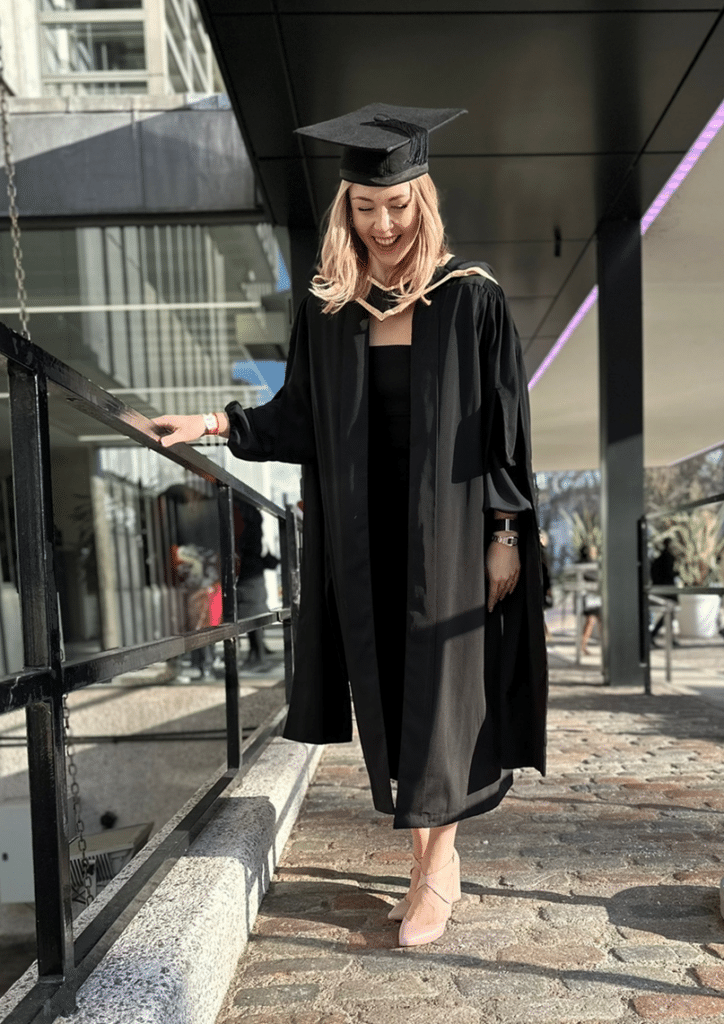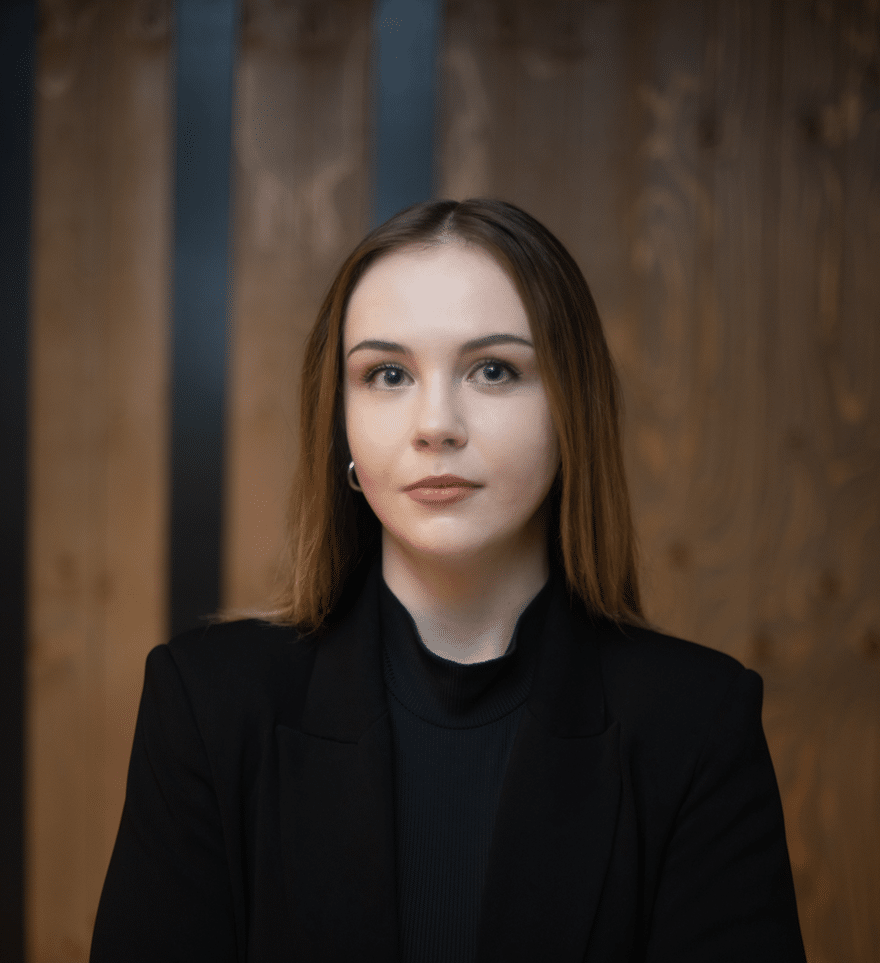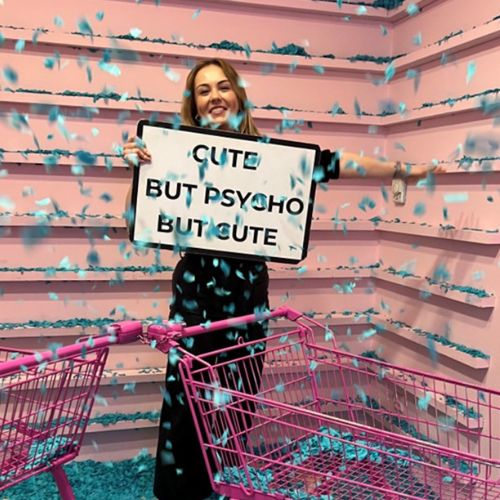Contents
Hello! Who are you?
Hello, I’m Justyna, and I currently live in the heart of London with my wonderful boyfriend.
For the past few years, I’ve been working in a Business Support role at a prestigious London University. Recently, I’ve also started my own coaching business, dedicated to helping women find fulfillment in their careers and family lives.
When I’m not spending time with loved ones or hitting the gym, you’ll usually find me diving into the world of research, particularly related to mental and physical health and a sense of purpose. Learning something new every day is my biggest passion.
As for happiness, I’ve never felt more content. To me, it’s all about the journey of aligning my actions with my values and desires. I’m finally being true to myself, and that’s what makes me genuinely happy.
💡 By the way: Do you find it hard to be happy and in control of your life? It may not be your fault. To help you feel better, we’ve condensed the information of 100’s of articles into a 10-step mental health cheat sheet to help you be more in control. 👇
What is your struggle and when did it start?
My mental health journey has been an intricate odyssey that began in my teenage years. It all started when I transitioned to junior high school and stopped dancing ballet, which had been a significant part of my life.
Dancing ballet and performing on stage made me feel unique, important, and confident among my peers. However, leaving that behind left me feeling like I didn’t quite fit in with “normal” teenagers.
During this challenging period, my best friend was my rock. We shared everything deeply, and their support helped me navigate these life-changing moments. However, as high school progressed, my best friends distanced themselves from me, seeking new friendships.
I felt I had become too dependent on them, and their decision to end our friendship during my final year of high school was devastating. I found myself without friends and support during a crucial time when I was preparing for exams that would determine my future.
Determined to escape my sad reality, I carried on with a plan my best friend and I had made earlier to study abroad in the UK. I couldn’t envision my life in Poland, as it seemed like everything had come to an end there. After high school graduation, I packed my bags and headed to England to work and eventually start university.
Although I didn’t get into the degree I had initially hoped for, I chose to study maths, which had been a source of comfort during my challenging teenage years.
My journey in England was marked by new experiences, meeting amazing people, and starting university. But it also came with its own set of difficulties. Studying math in a foreign language was tough, and I struggled to make friends as many people already had established connections.
I felt excluded and lonely once again, leading me to isolate myself and distance myself from family and friends. I became a people-pleaser with the friends I did have contact with, pretending everything was fine and prioritizing their needs over my own well-being.
Eventually, I failed my first year of university, and later my grandmother’s passing added to the emotional turmoil. I decided to move to London where I pursued psychology with cognitive neuroscience.
While my academic life improved, I faced challenges at work. I became emotionally involved in a restaurant job, taking on more responsibilities without adequate support. The manager’s behavior towards me was inappropriate, I experienced sexual verbal abuse and I ultimately left the job.
Then the pandemic hit, and I struggled to find employment, leading me to move to South London for an underpaid job. I felt like an outsider among coworkers of the same nationality who imposed their rules on me. Despite a seemingly friendly general manager, there were mixed signals and uncomfortable situations. I decided to quit once more, feeling voiceless.
How did this struggle make you feel at your worst moments?
During my teenage years, I became increasingly introverted and shy, feeling like I didn’t quite fit in. Stopping ballet, something that had made me feel special, was a major turning point. I went from being a class leader to just another face in the crowd.
I embarked on a journey to rediscover myself and find where I truly belonged. I became very private about my feelings and distanced myself from family and friends.
Leaving my home country and studying abroad presented its own set of challenges. I experienced months of intense loneliness, barely leaving my student hall. I slept during the day, avoiding people for weeks. I felt emotionally numb, happy for others’ successes but powerless in my own life.
Living conditions in my accommodation, including a lack of heating and bedbugs, only made things worse. I couldn’t envision a future, thinking that maybe not everyone could be happy, and perhaps I was meant to sacrifice for others, not find happiness myself.
When I failed at university, my parents urged me to make a quick decision about my future, not wanting me to take a gap year. Surprisingly, this pressure forced me out of my depressive state and compelled me to act. I secured a spot at a university in London, a city that felt incredibly daunting and vast at the time. Despite my reservations, I decided to embrace this opportunity and planned to relocate as soon as possible.
In the early years of my London journey, I grappled with loneliness. I pushed myself to socialize with co-workers and went on numerous dates, but despite my efforts, I struggled to form genuine connections with anyone.
During this time, I changed jobs frequently, holding nine different positions over five years. Unfortunately, I found myself consistently unhappy in these roles.
I either overworked myself or felt disrespected due to my gender or nationality, which severely impacted my self-esteem and my belief that things could ever improve.
It was baffling to me that, despite my knowledge and skills, I often felt like my management and friends treated me as if I were expendable, rather than appreciating my contributions. This constant treatment left me feeling exhausted, powerless, and as if I were worth no more than a bag of garbage.
👉 Share your story: Help thousands of people around the world by sharing your own story. We would love to publish your interview and have a positive impact on the world together. Learn more here.
Was there a moment when you started to turn things around?
After completing my bachelor’s degree, I decided to pursue a master’s in occupational psychology, driven by my desire to understand how organizations could treat employees without respect and still expect exceptional performance. Concurrently, I secured a position in higher education where, for the first time, I felt valued as a human being.
Life finally seemed to be on an upswing until the unexpected passing of my father while I was deeply engrossed in writing my dissertation. It was a shattering blow at a time when I had begun to see light at the end of the tunnel.
Despite this heartbreaking setback, one of the reasons I pressed on was to ultimately achieve distinction in my dissertation, as I didn’t want to burden my mom with any additional stress.
My grief became a catalyst for change, prompting me to embark on a profound journey of self-discovery. It was during this period that I unearthed my core values and redefined how I wanted to lead my life. I began contemplating the future, cultivating deeper connections, and learning to appreciate the people around me.
These changes allowed me to grow closer to my family and develop a healthier, more meaningful relationship with my boyfriend. Together, we began to envision a shared future and charted the path toward it, aligning our goals and aspirations.

I would say it took me around 5 years of constant battle until my dad’s passing away was the moment when the world stopped for me, but it didn’t stop for others. So, I had to learn how to start living my new life, and I am still learning.
What steps did you take to overcome your struggle?
When my world came to a halt, I found myself in survival mode. Even though I didn’t want to, I knew I had to take steps to benefit my body and mind.
So, I started attending gym classes to tend to my physical health, aiming to strengthen my mental resilience and surround myself with individuals on similar journeys towards positive change.
It was at the gym that I crossed paths with a few remarkable women who became my gym buddies, holding me accountable for our shared commitment to attending classes regularly.
Simultaneously, I began reestablishing connections with my family, making it a point to communicate with them on a weekly basis. I also started prioritizing quality time with my boyfriend and friends.
My travels to visit family in Poland increased significantly during the year my dad passed away. I found myself flying back around five times, often for birthdays and special occasions, which was considerably more frequent than in previous years combined.
During this time, journaling became a vital outlet. I began writing letters to myself, documenting how I felt each day and expressing my hopes for brighter days ahead. It was a roller coaster of emotions.
I diligently worked on maintaining a healthy routine, focusing on regular exercise, adequate sleep, nourishing meals, and no alcohol, all while engaging with positive, supportive individuals. However, there were still moments of struggle.
After several months, when I began to sense a gradual return of control over my life and felt that I was navigating my grief a bit more effectively, I decided to seize an opportunity and explore life coaching. This experience played a pivotal role in helping me recognize and celebrate my achievements.
It allowed me to start feeling genuinely proud of myself and gradually boosted my self-esteem and confidence. Through this transformative process, I discovered the powerful, resilient woman I had always been but had struggled to unleash.
I’m now much more conscious of what I’ve overcome, the milestones I’ve achieved, and my unwavering potential to create the life I’ve always envisioned.
In the process, I made the tough decision to distance myself from certain friends. I realized I was putting in more effort than I received, and it became frustrating when my efforts weren’t fully appreciated.
I didn’t feel the support I needed, so I reevaluated my friendships, choosing to invest my energy only in those who reciprocated and valued our connection. This period was intense, spanning several months to a year, and I acknowledge that I’m still a work in progress.

What truly aided my healing journey was persistently taking care of my mental and physical health, even when all I wanted was to do nothing and indulge in sugary treats.
I kept pushing forward, and my healthier body became a cornerstone for nurturing a healthier mind. Furthermore, having people I could trust and be completely authentic with significantly expedited my healing process.
Have you shared any of this with people around you in real life?
Opening up about my struggles became a pivotal moment in my healing journey, and it only happened after my dad passed away. At that point, I felt compelled to share my thoughts and emotions with my boyfriend and my closest friends, individuals who had undergone similar experiences.
I initiated these conversations because I wanted them to understand the emotional turbulence I was going through. I needed them to know that if I inadvertently hurt them, it was never my intention.
However, when it came to strangers or friends who had a habit of monopolizing conversations and not truly listening, I wasn’t comfortable discussing my struggles with them.
Additionally, I wanted to shield my mom from the initial wave of grief as things were still incredibly fresh and raw. It felt easier to confide in individuals I trusted implicitly, those who genuinely cared about my well-being and were willing to create a space where I could talk without the pressure of being cheered up.
As time passed, sharing my mental health struggles became more natural, especially with my family. I grew more mature and processed a substantial amount of emotions.
Nowadays, I engage in deep conversations with my sisters, working through various topics together. This level of openness and support has become possible because we’ve collectively put in the effort to address our past experiences, helping us connect on a profound level.
If you could give a single piece of advice to someone else that struggles, what would that be?
You have more power over your life than you are giving yourself credit for.
What have been the most influential books, podcasts, YouTube channels, or other resources for you?
- Personal Life Coaching enabled me to recognize my value, my achievements, and my boundless inner strength.
- Podcast: Diary of CEO provided me with valuable insights and strategies for optimizing both my mental and physical well-being
- The book Unfuck Yourself: Get Out of Your Head and Into Your Life by Gary John Bishop made me recognize the self-imposed limitations I’ve placed on myself, realizing that I am the sole obstacle preventing me from attaining the things I truly desire
- The book The Seven Principles for Making Marriage Work by John M. Gottman and Nan Silver made me understand that miscommunication within relationships is often a complex interplay of various factors, not simply a matter of blaming others or myself.
It’s about how we perceive conflicts, appreciate differing perspectives, and consider multiple contributing elements. As a result, I no longer take things as personally as before. I’ve gained a deeper understanding of people’s underlying intentions, and I’m less quick to become easily disheartened.
Where can we go to learn more about you?
I am very active on my TikTok account and Youtube channel where I share some tips and tricks to improve everyone’s daily life. You can also find me on Linkedin or read more on my website.
Is there anything else you think we should have asked you?
In today’s world, I actively promote open dialogue about challenges, with a strong desire to ensure that everyone feels heard and truly understood. It’s become evident that genuine conversation has become a rarity, where few truly listen or deeply care about your thoughts and emotions.
This unfortunate reality often leads people to believe they must turn to therapists to process their feelings. It’s disheartening because there’s another way.

My personal journey of self-discovery illuminated the profound importance of active listening. I learned that contributing isn’t always necessary; sometimes, all that’s needed is a compassionate ear.
This realization is one of the driving forces behind my decision to start my own business, where I assist women in clarifying their aspirations, affirming that their dreams are attainable, and guiding them on the path to achieving those dreams—all while safeguarding their mental well-being. I firmly believe that you can achieve everything you desire, but it requires a focused approach, tackling one aspect at a time
💡 By the way: If you want to start feeling better and more productive, I’ve condensed the information of 100’s of our articles into a 10-step mental health cheat sheet here. 👇
This Cheat Sheet Will Help You Be Happier and More Productive
Thrive under stress and crush your goals with these 10 unique tips for your mental health.
Want more interviews?
Continue reading our inspiring case studies and learn how to overcome mental health struggles in a positive way!
Want to help others with your story? We would love to publish your interview and have a positive impact on the world together. Learn more here.



